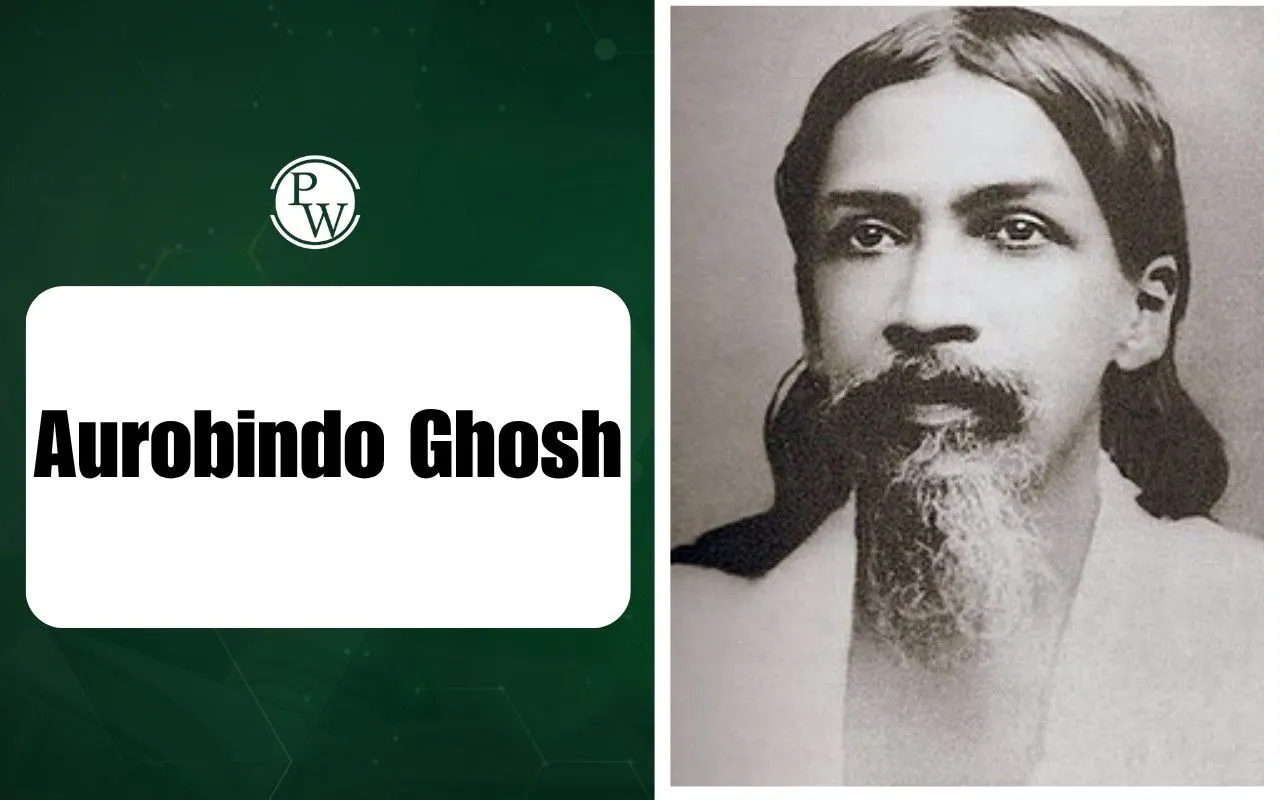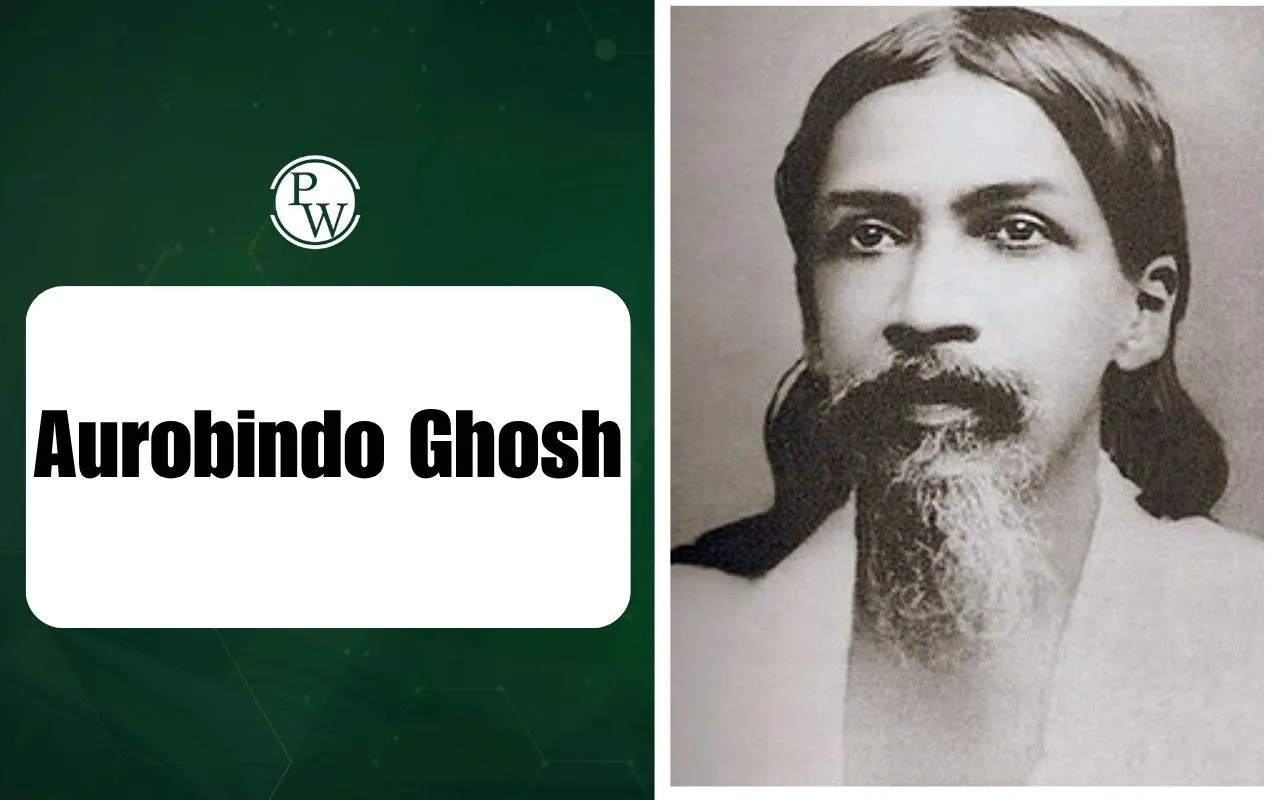

Aurobindo Ghosh was a multifaceted personality, an Indian revolutionary, philosopher, spiritual leader, poet, and visionary thinker. Born in 1872 in Kolkata, he played a significant role in India’s struggle for independence, inspiring young revolutionaries and advocating for complete self-rule. Later in life, he withdrew from active politics to focus on spiritual pursuits, developing the philosophy of Integral Yoga which emphasizes the evolution of human consciousness and the integration of spiritual and worldly life. Beyond politics and spirituality, Aurobindo made remarkable contributions to literature, philosophy and education leaving a lasting legacy that continues to inspire India and the world.
Aurobindo Ghosh Overview
Sri Aurobindo Ghosh was a revolutionary, philosopher, spiritual leader and writer whose life left a profound impact on India’s freedom struggle and modern spirituality. The table below provides an overview of his life, work and contributions.
|
Aurobindo Ghosh Overview |
|
|
Aspect |
Details |
|
Full Name |
Aurobindo Ackroyd Ghose |
|
Date of Birth |
15 August 1872 |
|
Place of Birth |
Kolkata, India |
|
Parents |
Dr. Krishna Dhun Ghose (father), Swarnalata Devi (mother) |
|
Education |
Christian Convent School, Darjeeling; St. Paul’s School, England; King’s College, Cambridge |
|
Early Career |
Indian Civil Service (qualified but did not join); Baroda State Service (1893–1906) |
|
Role in Revolutionary Movement |
Key figure in Bengal revolutionary activities; co-founder of Anushilan Samiti; editor of Bande Mataram, Karmayogin, Yugantar; imprisoned in Alipore Bomb Case (1908) |
|
Spiritual Pursuits |
Moved to Pondicherry in 1910; developed Integral Yoga with Mirra Alfassa (The Mother); founded Sri Aurobindo Ashram in 1926 |
|
Philosophy |
Integral Yoga; evolution of consciousness; integration of spiritual and worldly life; manifestation of divine life on Earth |
|
Famous Works |
Savitri, The Life Divine, The Synthesis of Yoga, Essays on the Gita, Collected Poems and Plays, The Human Cycle, The Ideal of Human Unity, On the Veda |
|
Five Dreams |
1. Free and united India 2. Resurgence of Asia 3. World union for peace 4. Spiritual gift of India to the world 5. Human evolution to higher consciousness |
|
Date of Death |
5 December 1950 |
|
Legacy |
Inspiration for Indian nationalism, spirituality, literature, and education; ongoing work in Auroville, Pondicherry |
Aurobindo Ghosh Biography
Aurobindo Ghosh originally named Aurobindo Ackroyd Ghose, was born on 15 August 1872 in Kolkata into an educated Bengali family. His father, Dr. Krishna Dhun Ghose was a civil surgeon and his mother Swarnalata Devi, was a progressive thinker and women rights activist.
From an early age Aurobindo exhibited exceptional intellectual capabilities. He was deeply interested in literature, philosophy and classical languages. His upbringing in a family that valued education and social reform shaped his later revolutionary and spiritual pursuits.
After completing his early education in India, Aurobindo was sent to England for further studies, where he excelled academically. After returning to India he immersed himself in public service, politics and eventually spiritual practice. Aurobindo life is often divided into two phases: his revolutionary phase (1900–1910) and his spiritual-philosophical phase (1910–1950).
Sri Aurobindo Ghosh Education
Aurobindo Ghosh education laid the foundation for his exceptional intellectual and spiritual development. His father emphasized the importance of Western education, and Aurobindo began his schooling at a Christian convent school in Darjeeling. Later he attended St. Paul’s School in England, excelling particularly in Latin, Greek and classical literature.
Aurobindo academic brilliance earned him a scholarship to King’s College, Cambridge, where he studied philosophy, English literature and political thought. His exposure to Western philosophy, combined with his Indian cultural roots, shaped his unique worldview, merging the rational with the spiritual.
He later qualified for the Indian Civil Service (ICS) in 1890 but deliberately avoided joining it, as he was deeply motivated by the desire to serve India rather than a colonial government. Instead, he returned to India in 1893 to join the Baroda State Service where he worked for over a decade, gaining administrative and teaching experience.
Sri Aurobindo Ghosh Role in Revolutionary Movement
Aurobindo Ghosh played a crucial role in India early struggle for independence. His revolutionary activities began in the late 19th and early 20th centuries, at a time when the nationalist movement was gaining momentum. He firmly believed that complete independence (Purna Swaraj) was the only goal for India, rather than mere reforms under British rule.
After the Partition of Bengal in 1905, Aurobindo relocated to Calcutta, where he became a central figure in inspiring young revolutionaries. He co-founded youth clubs and secret societies, including the famous Anushilan Samiti which trained young men in physical fitness, martial arts, and nationalist ideology.
He also contributed to nationalist journalism, editing influential publications like Bande Mataram, Karmayogin and Yugantar which motivated Indians to participate in the freedom struggle and highlighted the need for self-rule.
One of the most notable events in his revolutionary career was the Alipore Bomb Case of 1908, in which he was arrested for alleged involvement in revolutionary activities. He spent nearly a year in solitary confinement in Alipore Central Jail but was later released through the efforts of Deshbandhu Chittaranjan Das.
Aurobindo’s approach combined practical political action with deep strategic thinking, earning him the title Prophet of Indian Nationalism. His influence extended to many key revolutionaries, including Bagha Jatin and Jatin Mukherjee who continued the fight for India’s freedom.
Sri Aurobindo Ashram
In 1910, Sri Aurobindo stepped back from active politics and took residence in Pondicherry, a French colony at that time, to concentrate on his spiritual calling. In 1926, he and his collaborator, Mirra Alfassa (The Mother), began the Sri Aurobindo Ashram.
The ashram became a home and community for spiritual seekers from India and around the world. It promoted the practice of Integral Yoga, requiring aspirants to integrate their spiritual practice alongside their daily life. It strongly encouraged communal living, education, healthcare, and selfless service to demonstrate Aurobindo's social vision of spiritual evolution alongside life in society.
Under Sri Aurobindo and The Mother's guidance, the ashram flourished as a center of intellectual, spiritual and cultural life. It today continues to be a center for spiritual pursuits and communal life, currently thousands of visitors and followers attend daily from around the world.
Sri Aurobindo Famous Works
Sri Aurobindo Ghosh was a prolific writer whose works spanned philosophy, poetry, political essays and spiritual treatises. Some of his most notable works include:
-
Savitri: An epic poem of over 24,000 lines considered his magnum opus. It explores themes of love, death, spiritual transformation and the triumph of the human spirit.
-
The Life Divine (1939): A philosophical text presenting his vision of human evolution and spiritual progress, advocating that spiritual growth should not be separate from life on Earth.
-
The Synthesis of Yoga: A detailed guide on the principles and practices of Integral Yoga, aiming for the integration of body, mind and spirit.
-
Essays on the Gita (1922): An interpretation of the Bhagavad Gita highlighting its relevance for modern life.
-
Collected Poems and Plays (1942): A compilation reflecting his literary genius and spiritual insight.
-
The Human Cycle (1949) & The Ideal of Human Unity (1949): Works focusing on social and political philosophy emphasizing human progress and unity.
-
On the Veda (1956): An exploration of India spiritual texts and philosophy.
Sri Aurobindo Philosophy
Sri Aurobindo philosophy revolves around Integral Yoga, which aims for the complete transformation of human nature. He believed that traditional spiritual goals, like liberation (moksha), should not be pursued in isolation from the world. Instead, spiritual evolution should lead to a divine life on Earth. Key elements of his philosophy include:
-
Integration of Life and Spirit: Spiritual practice should be harmonized with daily living and responsibilities.
-
Evolution of Consciousness: Humans can evolve beyond mind and intellect into supermind, achieving higher awareness and divine qualities.
-
Transformative Yoga: Through Integral Yoga, individuals can transform physical, emotional and mental aspects of life to reach spiritual realization.
-
Divine Manifestation: Aurobindo envisioned a future where humanity collectively manifests divine love, knowledge and harmony in the world.
Sri Aurobindo Ghosh Five Dreams
Sri Aurobindo outlined five dreams for India and the world, reflecting his vision of political, social and spiritual progress:
-
A Free and United India: He envisioned India achieving complete independence with national unity and cultural revival.
-
Resurgence of Asia: He believed in the revitalization of Asian civilizations, restoring their dignity and role in global progress.
-
A World Union: Aurobindo advocated for global cooperation and understanding to ensure lasting peace and collective development.
-
Spiritual Gift of India: India, according to Aurobindo, has a unique spiritual heritage that can guide humanity toward higher consciousness.
-
Human Evolution: He hoped humanity would reach higher states of consciousness, enabling the resolution of social, moral and spiritual challenges.
